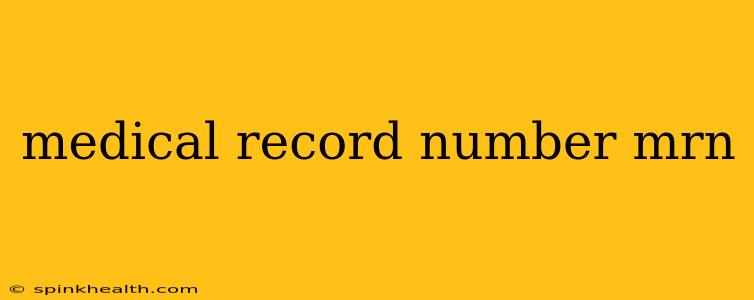Decoding the Mystery: Understanding Your Medical Record Number (MRN)
Have you ever wondered about that seemingly random string of numbers and letters that follows you through your healthcare journey? It's your Medical Record Number (MRN), and it's far more important than you might think. Think of it as your unique identifier in the vast world of medical records, a key that unlocks your personal health history within a specific healthcare system. Let's delve into the world of MRNs and unravel some common questions.
What is a Medical Record Number (MRN)?
Imagine a massive library, filled with countless books – each representing a patient's health information. Your MRN is like your library card, uniquely identifying your specific collection of medical records within a particular hospital, clinic, or healthcare provider's system. It's a crucial piece of information that allows healthcare professionals to quickly and accurately access your past and present medical history, ensuring consistent and effective care. Unlike your Social Security number, which is used across various sectors, your MRN is specific to a single healthcare system. You'll likely have a different MRN for every hospital or clinic you've visited.
Why is my MRN important?
Your MRN is the cornerstone of your medical record's organization. It ensures that all your information – from lab results and doctor's notes to imaging scans and medication lists – is securely linked together under your unique identifier. This streamlined access is vital for:
- Continuity of Care: When you see a new doctor within the same system, your MRN allows them to instantly access your complete health history, preventing unnecessary tests and ensuring informed treatment decisions.
- Efficient Record Keeping: Imagine the chaos of trying to manage millions of patient records without a unique identifier! MRNs streamline the process, making it easier for administrators and medical staff to locate and manage your files.
- Patient Safety: Accurate identification via your MRN minimizes the risk of medical errors by ensuring that the correct records are accessed for each patient.
How is my MRN assigned?
The process of assigning an MRN varies depending on the healthcare provider. Some systems use sophisticated algorithms to generate unique numbers, while others may use simpler sequential numbering. Regardless of the method, the goal remains the same: to create a unique identifier that prevents any confusion or duplication. You usually receive your MRN during your first visit to a new healthcare provider.
What if I lose my MRN?
Don't panic! Most healthcare providers have systems in place to help you retrieve your MRN. Contact the institution's patient services department, or the office of your primary care physician. You will likely need to provide identifying information such as your name, date of birth, and address to help them locate your record.
Can my MRN be used to access my records online?
Many healthcare systems offer online patient portals that allow you to access your medical records. While your MRN is often a key component of the login process, it's rarely the only form of identification used. These portals typically require additional security measures, such as a password or other verification methods, to protect the confidentiality of your sensitive information.
Is my MRN confidential?
Yes, your MRN is considered confidential medical information, protected by privacy laws such as HIPAA (in the United States). Healthcare providers have strict protocols in place to safeguard this information from unauthorized access or disclosure.
In conclusion, your Medical Record Number is a crucial piece of the healthcare puzzle. It's a silent guardian of your medical history, ensuring efficient, safe, and effective care. Understanding its importance can help you navigate the healthcare system with greater ease and confidence.

